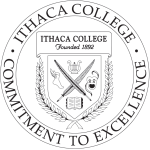The Ithacan
 |
|
| Motto | Commitment to Excellence |
|---|---|
| Type | Private |
| Established | 1892 |
| Endowment | $269 million |
| President | Shirley M. Collado |
|
Academic staff
|
790 |
|
Administrative staff
|
1,083 |
| Students | 6,769 |
| Undergraduates | 6,969 |
| Postgraduates | 446 |
| Location | Ithaca, NY, USA |
| Campus | Small city, 757 acres (3.06 km2) |
| Colors | Blue and gold |
| Athletics |
NCAA Division III – Liberty League USCSSA |
| Nickname | Bombers |
| Affiliations |
NAICU CIC |
| Website | ithaca.edu |
 |
|
| University rankings | |
|---|---|
| National | |
| Forbes | 248 |
| Regional | |
| U.S. News & World Report | 6 |
| Master's University class | |
| Washington Monthly | 104 |
Ithaca College is a private, nonsectarian, coeducational liberal arts college located on the South Hill of Ithaca, New York, United States. The college was founded by William Egbert in 1892 as a conservatory of music and is set against the backdrop of the city of Ithaca, Cayuga Lake, waterfalls, and gorges. The college is best known for its large list of alumni who have played substantial roles in the media and entertainment industries.
Ithaca College is internationally known for the Roy H. Park School of Communications, which was most recently ranked by several organizations as a top school for journalism, film, media and entertainment. The college has a strong liberal arts core, and offers several pre-professional programs, along with some graduate programs.
Ithaca College has been ranked among the Top 10 masters universities in the "Regional Universities North" category by U.S. News & World Report, every year since 1996, and was ranked 6th in 2016. Ithaca College is consistently named among the best colleges in the nation by Princeton Review, with the 2018 guide ranking the college #3 for theater, #3 for newspaper, and #6 for Radio. and is among the top schools producing Fulbright scholarship recipients.
Ithaca College was founded as the Ithaca Conservatory of Music in 1892 when a local violin teacher, William Grant Egbert, rented four rooms and arranged for the instruction of eight students. For nearly seven decades the institution flourished in the city of Ithaca, adding to its music curriculum the study of elocution, dance, physical education, speech correction, radio, business, and the liberal arts. In 1931 the conservatory was chartered as a private college. The college was originally housed in the Boardman House, that later became the Ithaca College Museum of Art, and it was listed on the National Register of Historic Places in 1971.
...
Wikipedia
